June 17, 2025 | 18:45 GMT +7
June 17, 2025 | 18:45 GMT +7
Hotline: 0913.378.918
June 17, 2025 | 18:45 GMT +7
Hotline: 0913.378.918
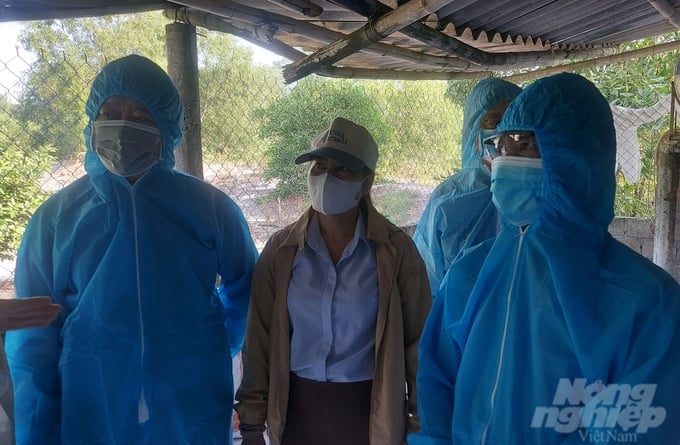
Livestock farmer’s carelessness is one of the reasons why African swine fever spreads widely. Photo: Vo Dung.
It was mid-2023. Phan Thi Truc in village 9, Trieu Van commune, Trieu Phong district borrowed VND 150 million from the bank and relatives to raise pigs. In the first batch, she sold 25 pigs for meat, but at that time prices were low, so she lost VND 10 million.
Preparing for the Lunar New Year, Truc bought another 97 breeding pigs to raise. However, in early November, pigs began to show signs of disease. At first, she bought medicine to treat the pigs herself but it did not help. She had to bury 8 of them in the corner of the garden, 100 meters away from the cage.
“Before the epidemic came, I was able to sell 30 pigs. At first, I thought the pigs were just suffering from common diseases so I was careless and did not notify the commune. Therefore, 28 pigs were buried by the People's Committee of Trieu Van commune. The total weight of the dead pigs was approximately 1.3 tons, the damage was nearly VND 100 million," Truc said.
Previously at the end of 2019, the pig herd of Truc's family had to be discarded, which was also the consequence of carelessness. At that time, while the pig herd of Trieu Van commune was almost wiped out due to African swine fever, Truc's pigs were still safe. One time she sold the pigs in the middle of the epidemic season, and as a result, 29 pigs in the family’s barn were infected with African swine fever. Since then, Truc has left the barn empty. It was not until mid-2023 that she once again found the courage to re-herd.
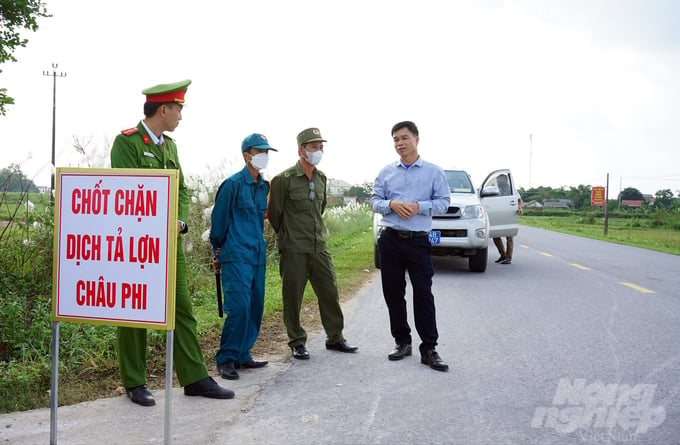
Some quarantine checkpoints have not met the requirements, thus increasing the risk of pigs infected with African swine fever being transported and consumed. Photo: Vo Dung.
The report of the People's Committee of Trieu Phong district as of November 26 shows that African swine fever has spread to 18/18 communes and towns within the district. Local authorities are forced to destroy nearly 50 tons of feeder pigs. Of these, boars, sows, and porkers account for nearly 97% of the weight and nearly 64% of the total herd.
Officers at the district People's Committee believe that the emergence and widespread of African swine fever were due to small-scale livestock farming occupying a large proportion, high farming density, poor environmental sanitation, and lack of biosecurity measures. Farmer’s negligence and carelessness are also what caused the disease to spread quickly.
“Livestock farmers and traders are not fully aware of the dangers of African swine fever. On the other hand, a number of quarantine checkpoints are not working at their full capacity. The situation of transporting and dumping pig carcasses must be prevented promptly. I propose that the Department of Natural Resources and Environment advise the provincial People's Committee to plan a safe burial site for infected pigs," Nguyen Phu Quoc, Deputy Director of Quang Tri Department of Agriculture and Rural Development said.
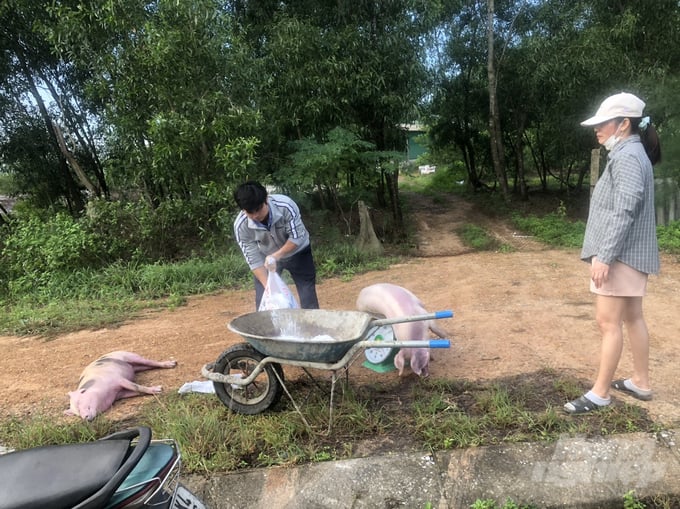
African swine fever spread to 7/10 districts, cities and towns in Quang Tri. Authorities had to destroy over 1,100 pigs, equivalent to 51 tons of meat. Photo: Vo Dung.
While farmers still do not have a good grasp of the African swine fever vaccine, preventing the spread of African swine fever poses certain difficulties in terms of policy.
According to Nguyen Trung Hau, Director of Quang Tri Sub-department Livestock Production and Animal Health, the Government and the Ministry of Agriculture and Rural Development advocate introducing African swine fever vaccine into the general disease prevention practice.
The problem is that this disease is not on the list of mandatory vaccinations, so local authorities have a hard time using the budget to support people in purchasing vaccines. The price of African swine fever vaccine is quite high at the moment, and considering that small scale livestock production holds the majority, not all households can confidently spend their own money to vaccinate pigs.
Vaccine manufacturers recommend not to vaccinate sows while sows are susceptible to high rates of infection. The best time to inject African swine fever vaccine is when the pigs are healthy, but in order to know whether they are healthy or not, examination is required.
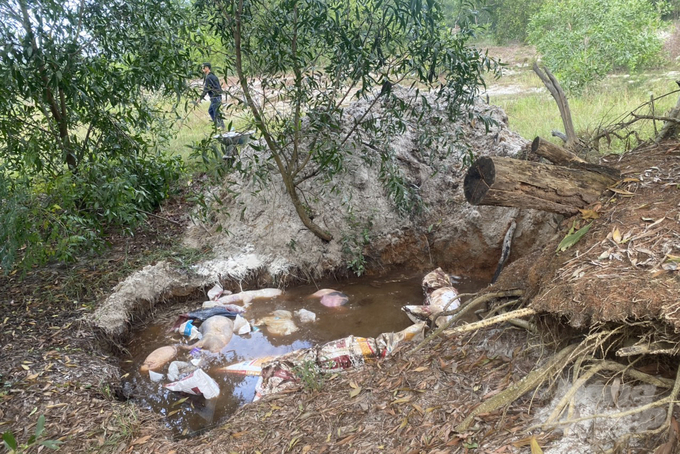
The burial pit for sick pigs in Quang Tri is filled with water because of the sandy coastal area. Photo: Vo Dung.
African swine fever spreads quickly and shows extremely complicated developments. In just 1 month, authorities in Quang Tri province have to discard over 1,100 pigs. Quang Tri livestock farmers need approximately 15,000 liters of disinfectant chemicals. Up to now, the province has only allocated a reserve source of over 500 liters of chemicals and nearly 2.6 tons of lime powder to support people. Some localities also set aside reserve resources, but the amount is insignificant.
Translated by Samuel Pham
![Turning wind and rain into action: [5] Hue applies modern technology in disaster forecasting](https://t.ex-cdn.com/nongnghiepmoitruong.vn/608w/files/news/2025/06/17/z6704423696987_15fd32ffc26d590d204d520c9dac6786-nongnghiep-093938.jpg)
(VAN) In Hue city, modern technology has recently been applied in meteorological and hydrological forecasting and warning, helping to reduce the damage caused by natural disasters.

(VAN) A cutting-edge farming technique being implemented on an experimental ranch in Arizona's Sonoran Desert has already saved a billion gallons of water over five years, according to Civil Eats.

(VAN) Poultry and pig production and the environment can be boosted through enhanced water technology, according to new research.
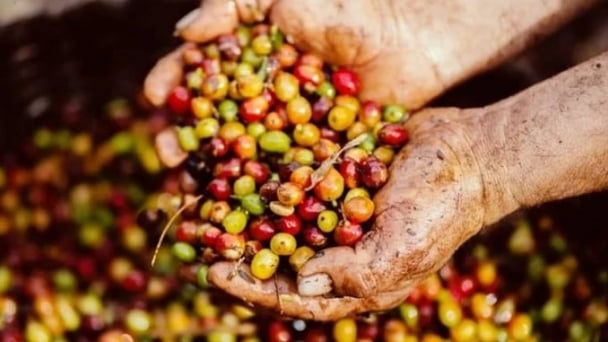
(VAN) Coffee prices on June 16, 2025 are unchanged. In Vietnam, local trading prices are holding steady, ranging around VND 112,000 – VND 112,500/kg.
![Turning wind and rain into action: [4] Bringing climate bulletins to remote and isolated areas](https://t.ex-cdn.com/nongnghiepmoitruong.vn/608w/files/linhnhp/2025/06/14/1152-z6704423696987_15fd32ffc26d590d204d520c9dac6786-nongnghiep-151141.jpg)
(VAN) The Vietnam Agriculture and Nature Newspaper interviewed Mr. Vu Thai Truong, Acting Head of Climate Change and Environment at UNDP Vietnam, to gain deeper insight into how climate bulletins are delivered to farmers.

(VAN) In Tien Giang, a high-tech shrimp farm has developed a distinctive energy-saving farming model that has yielded promising results.
![Turning wind and rain into action: [3] 300.000 farmers benefit from agro-climatic bulletins](https://t.ex-cdn.com/nongnghiepmoitruong.vn/608w/files/news/2025/06/12/e5a48259d6a262fc3bb3-nongnghiep-125122.jpg)
(VAN) The agro-climatic bulletin has become a valuable tool for farmers in the Mekong Delta. After more than five years of implementation, the initiative is gradually being expanded nationwide.